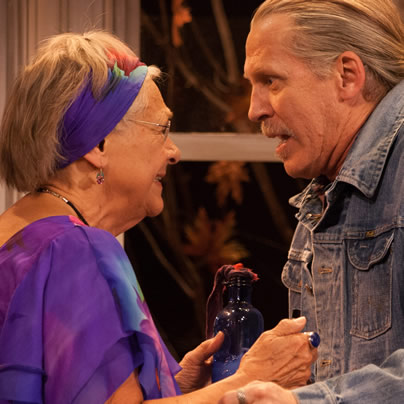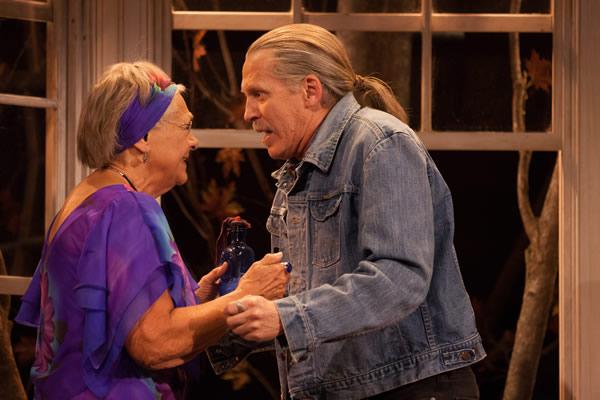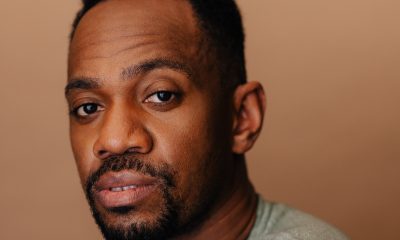Arts & Entertainment
Maintaining mystery
Out actor Spinella says ‘Velocity’ better experienced blind


Estelle Parsons as Alexandra and Stephen Spinella as Chris in “The Velocity of Autumn’ at Arena Stage at the Mead Center for American Theater. It runs through Oct. 20. (Photo by Teresa Wood; courtesy Arena)
‘The Velocity of Autumn’
Through Oct. 20
Arena Stage
1101 Sixth Street, SW
$40-90
Arenastage.org
Broadway star Stephen Spinella almost never leaves New York City to work.
“I’ll only go for incredibly special situations,” he says. “I love my apartment. I have a great support system of friends. I’m just not a happy camper outside of New York. It’s got to be something really great to tempt me.”
Playing opposite Academy Award-winning actress Estelle Parsons in Arena Stage’s “The Velocity of Autumn” is one of those impossible-to-refuse situations.
“Last winter I got a call from Molly Smith [Arena’s artistic director and ‘Velocity’s’ director] offering me the job,” says Spinella, who is gay. “I asked why they’d reached out to me. Molly said I was Parsons’ first choice to play her son. You don’t say no to that.”
Penned by Cleveland-based playwright Eric Coble, the two-character play focuses on 79-year-old Alexandra, who is experiencing the early signs of dementia. Holed up in her Brooklyn brownstone with a cache of homemade explosives, she threatens to blow up the house and herself rather than rethink a less independent living arrangement. It’s then that her estranged gay son Chris is brought in to mediate.
Spinella, widely known for his brilliant Tony Award-winning performances as Prior Walter (a gay man with AIDS) in “Angels in America: Millennium Approaches” and “Angels in America: Perestroika,” won’t reveal much — he believes an audience should experience a play blind. But he will say that in 90 uninterrupted minutes, Chris and Alexandra must find out where they’ve been, where they are now and how they’re going to resolve her issues. It’s a lot to cover.
In real life, Spinella’s 90-year-old mother suffers from dementia. She lives in a care facility in Arizona. But unlike his mother, says Spinella, “Alexandra is still very alert and aware. She’s an artist and very self-reliant. Her character is processing what is happening to her and what she wants to do. That’s a big part of what the play is about.”
And while we’re told Spinella’s character is gay, it’s mentioned rather offhandedly. The straight playwright Coble, says he was intrigued with the idea of Chris’ sexuality not being the focal point.
“So often when being gay is used as a dramatic device it’s the entire focus of the character,” Coble says. “I wanted to write a character who’s not struggling with his sexuality. There are other reasons why he needed to get out of New York City and live far from his mother and more conventionally successful siblings.”
Spinella concurs: “The fact that he’s gay is almost completely unimportant to the play. It’s a minor revelation. When he left home, it was probably more important but it’s essentially dissolved in the way that it has for so many of us in this country.”
For Coble, having Parsons (who won her Oscar for “Bonnie and Clyde” and hilariously played Bev on “Roseanne” for a decade) and Spinella bring his characters to life has been a joy and slightly unnerving. “They’re so good and so smart,” he says. “Their ‘truthometers’ are very high — they have a way at getting at the kernel of truth in every moment. It’s an incredible thing to see and experience.”
And Spinella is rhapsodic about 85-year-old Parsons: “She has that frank New England aspect. It’s great for the character. She’s always surprising — incredibly smart and sensitive with a steel trap mind. She and her husband Peter are both like jocks. They cycle, walk, swim and hike. They’re also fun — really wonderful people.”
Next year, Spinella can be seen HBO’s movie version of Larry Kramer’s seminal AIDS play “The Normal Heart.” He describes the experience as fantastic and intense. His part (Sanford) is small but important. “Early in the play his KS lesions are revealed in the doctor’s office,” says Spinella. “And later, in a newly added scene set in a hospital, he is wild with dementia, calling for his dog. He totally loses it and falls apart.”
But for today, Spinella is happily immersed in “Velocity.” When the show closes next month, he returns to New York City, that place he hates to leave.
Out & About
Plan your wedding the LGBTQ way
Washington D.C. LGBTQ+ Wedding Expo scheduled for Sunday

Rainbow Wedding Network will host “Washington D.C. LGBTQ+ Wedding Expo” on Sunday, March 1 at 12:30 p.m.
Guests can meet and mingle with a curated selection of LGBTQ-welcoming wedding professionals from across the region, each ready to help bring your vision to life, and spend a beautiful afternoon exploring everything they need to create a celebration that reflects them.
There will be a relaxed, self-guided look at the Watergate’s spaces and amenities, savor signature cocktails and delicious tasting samples, and connect with other couples who are on the same journey.
Visit Eventbrite to reserve a spot.

Friday, February 27
Center Aging Monthly Luncheon With Yoga and Drag Bingo will be at 12 p.m. at the DC Center for the LGBT Community. Email Mac at [email protected] if you require ASL interpreter assistance, have any dietary restrictions, or questions about this event.
Go Gay DC will host “LGBTQ+ Community Happy Hour Meetup” at 7 p.m. at Freddie’s Beach Bar and Restaurant. This is a chance to relax, make new friends, and enjoy happy hour specials at this classic retro venue. Attendance is free and more details are available on Eventbrite.
Trans Discussion Group will be at 7 p.m. on Zoom. This group is intended to provide an emotionally and physically safe space for trans people and those who may be questioning their gender identity/expression to join together in community and learn from one another. For more details, email [email protected].
Saturday, February 28
Go Gay DC will host “LGBTQ+ Community Brunch” at 11 a.m. at Freddie’s Beach Bar & Restaurant. This fun weekly event brings the DMV area LGBTQ+ community, including allies, together for delicious food and conversation. Attendance is free and more details are available on Eventbrite.
The DC Center for the LGBT Community will host “Sunday Supper on Saturday” at 2 p.m. It’s more than just an event; it’s an opportunity to step away from the busyness of life and invest in something meaningful, and enjoy delicious food, genuine laughter, and conversations that spark connection and inspiration. For more details, visit the Center’s website.
Black Lesbian Support Group will be at 1 p.m. on Zoom. This is a peer-led support group devoted to the joys and challenges of being a Black lesbian. You do not need to be a member of the Beta Kappa Chapter or the Beta Phi Omega Sorority in order to join, but they do ask that you either identify as a lesbian or are questioning that aspect of your identity.Send an email to [email protected] to receive the zoom link.
Sunday, March 1
LGBTQ+ Community Coffee and Conversation will be at 12 p.m. at As You Are. This event is for people looking to make more friends and meaningful connections in the LGBTQ community. Attendance is free and more details are available on Eventbrite.
Monday, March 2
“Center Aging: Monday Coffee Klatch” will be at 10 a.m. on Zoom. This is a social hour for older LGBTQ+ adults. Guests are encouraged to bring a beverage of choice. For more information, contact Adam ([email protected]).
Tuesday, March 3
Universal Pride Meeting will be at 7 p.m. on Zoom. This group seeks to support, educate, empower, and create change for people with disabilities. For more details, email [email protected].
Wednesday, March 4
Job Club will be at 6 p.m. on Zoom upon request. This is a weekly job support program to help job entrants and seekers, including the long-term unemployed, improve self-confidence, motivation, resilience and productivity for effective job searches and networking — allowing participants to move away from being merely “applicants” toward being “candidates.” For more information, email [email protected] or visit www.thedccenter.org/careers.
Center Aging Women’s Social and Discussion Group will be at 6 p.m. on Zoom. This group is a place where older LGBTQ+ women can meet and socialize with one another. There will be discussion, activities, and a chance for guests to share what they want future events to include. For more information, email [email protected].
Thursday, March 5
The DC Center’s Fresh Produce Program will be held all day at the DC Center for the LGBT Community. People will be informed on Wednesday at 5 p.m. if they are picked to receive a produce box. No proof of residency or income is required. For more information, email [email protected] or call 202-682-2245.
Virtual Yoga Class will be at 7 p.m. on Zoom. This free weekly class is a combination of yoga, breathwork and meditation that allows LGBTQ+ community members to continue their healing journey with somatic and mindfulness practices. For more details, visit the DC Center’s website.
a&e features
Transmission DC breathes new life into a storied sound space
A fresh home for boundary-pushing culture on H Street

Late last year, phoenix-style, a fresh home for boundary-pushing culture arose on the H Street corridor. Transmission DC – a queer, trans, and POC-owned, operated, and centered community-focused venue – powered on in the former home to the Rock & Roll Hotel (famously, not a hotel, but very much rock & roll). Transmission (1353 H St., N.E.) arrives secure in its mandate – or even birthright – to provide a place to celebrate creativity and music through a lens of inclusivity and respect.
Transmission’s team brings experience, but also representation. Owners/partners Kabir Khanna (who is also programming director), Katii B, Ellie McDyre, and Kelli Kerrigan together previously managed 618 productions, a venue in Chinatown, crafting “some of D.C.’s freakiest parties, raves, and mosh pits” they note.
They packed up operations last fall to a space curated specifically for D.C.’s underground music and culture scene, building their efforts in Chinatown to bring in more fans in queer and POC circles.
Transmission, Khanna points out, is built on DIY values. In the music scene, DIY means that promoters and organizers – often disconnected from the mainstream and part of marginalized communities – build shows and programs collaboratively, but independently from institutions, supporting each other as smaller, independent venues close. Here, Transmission aims to ensure that those putting together these underground inclusive shows have a more permanent and stable home, can have access to resources, and can provide more sustainable income to artists. “We’re trying to get more people to support and enjoy the music, and also give artists and organizers within the DIY community more structure and a larger cut,” says Khanna.
Khanna also notes that Transmission operates “under the principles of safety, inclusivity, and respect.” McDyre added that even at venues that claim inclusivity, that statement might not take place in practice. We’re “not just pitting up a rainbow flag,” says McDyre, but as some of the owners are trans and POC, audiences can see themselves reflected at the top.
Much like the DIY nature of the music community, the Transmission owners brought a DIY ethos to turning around their space.
In March 2020 – the height of COVID lockdowns – Rock & Roll Hotel suddenly shuttered, though not due to the pandemic; instead, the venue claimed that decreasing sales and increasing competition led to the closure. For 14 years, it was the central spot for cheap beer and lesser-known and celebrated acts. The space stood vacant for more than five years, until Transmission turned the power back on.
“When we got into the space, it was effectively abandoned for years,” says Khanna. “There was a ton of mold, and paint primer covering all surfaces. It was nearly falling apart.” Khanna noted that many music venues like this one, regardless of how well it was maintained, “get the shit kicked out of it,” given the nature of shows. The team called in mold removal contractors, ripped up most of the floorboards, and started fresh.
Transmission’s first floor is styled as a stripped-down black box: the better to take in the music. “It’s minimal on purpose to act as a canvas for set design and music,” without a specific aesthetic, says Khanna. Moving upstairs, the second floor has been opened up, removing some walls, and now has a larger dance area than the first floor. Beyond the first two performance levels, and a holdover from Rock & Roll Hotel, is the rooftop. Though without a stage, the rooftop space is filled with murals splashed across the walls, with a full bar. Transmission’s current capacity is 496, but the team is looking to grow that number. Transmission will also leverage the full kitchen that Rock & Roll Hotel operated, bringing in Third Hand Kitchen to offer a variety of food, including vegan and vegetarian options.
Khanna pointed out an upcoming show reflective of Transmission’s inclusive ethos: Black Techo Matters on Feb. 27. The event is set to be “a dynamic, collaborative night of underground electronic music celebrating Black History Month.” Khanna says that techno came from Black music origins, and this event will celebrate this genesis with a host of artists, including DJ Stingray 313, Carlos Souffront, and Femanyst.




















